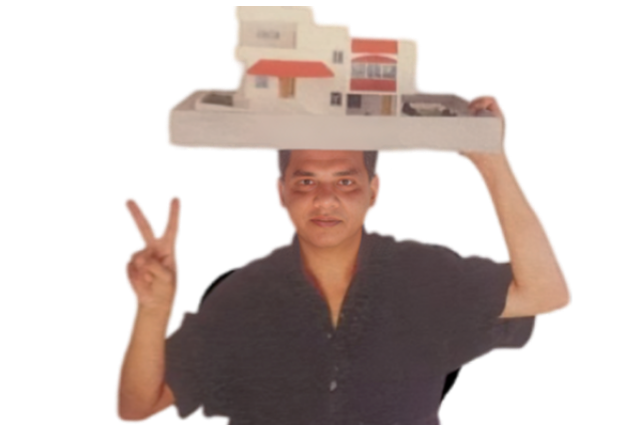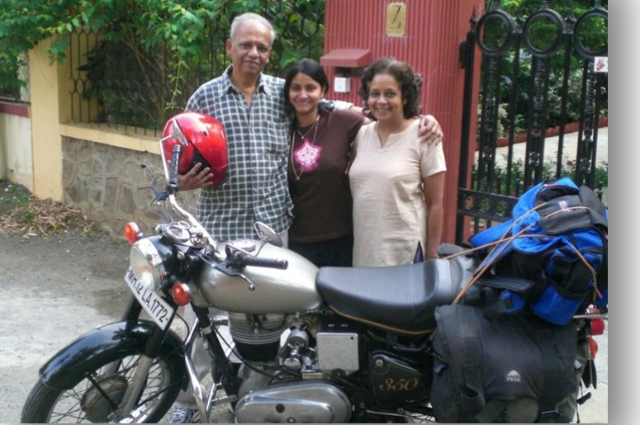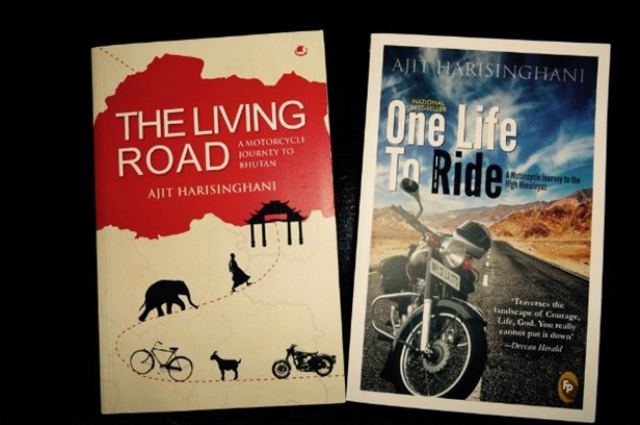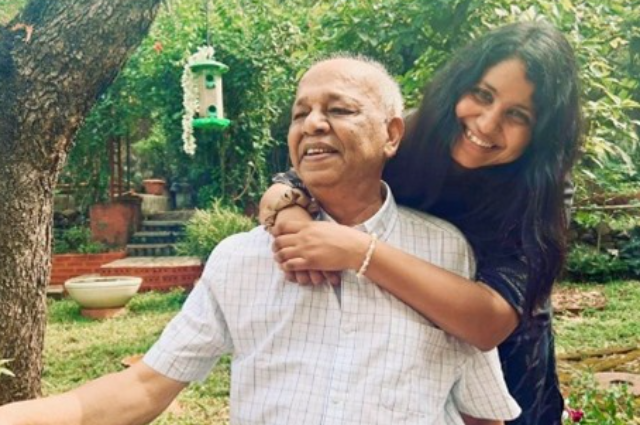
How a speech therapist’s passion for motorcycling taught me that finding your voice sometimes begins with finding your freedom
Before I was even born, my father made a decision that would come to define him — and later, define me. In 1991, he chose to build our family home on a wild, lonely slope of the Pune hills, where everyone warned him the land was too remote, too barren, too risky. But my father saw possibility where others saw fear. After training and practicing as a speech therapist in America, he returned to Pune to create his own practice. And when he was with the patients, he was readying his motorcycle for the next ride into the unknown — a man whose courage lived equally in the words he helped unlock and in the journeys he chose to take.
His courage was already shaping the childhood I would grow up to inherit. In many ways, my own dreams are rooted in those same fearless choices.
My father’s work as a speech therapist was never just a job; it was a commitment to liberating voices trapped by fear, hesitation, or disability. After returning from America, his wife and he shifted to Pune where he opened his own clinic on Karve Road. They bought a small flat as money was tight and not long after, my father said that he didn’t want to live here anymore. The words hit my mother like a flash flood. They had put all their money into this flat. And so, his courageous nature took him around Pune.
He rode around Pune for days, scanning empty hillsides that most people wouldn’t even glance at, let alone consider living on. The city was expanding, but these rugged slopes seemed beyond its reach, dotted with little more than thorny brush and the occasional wild animals. Everyone told him it was foolish — no water, no electricity, no neighbors, and no sense of safety. But he saw a future there, a canvas where he could build not just a house, but a way of life that matched his unbound spirit. Against every warning and every doubting voice, he bought a barren plot and sat on a rock designing and thinking about the house. That same rock today, still sits in our garage, a quiet memory of where it all began. Recently, he tried to destroy it, but to our surprise, it held its shape and stayed exactly as it was, unwilling to let go.
On one of those first days exploring that barren land, a surprising royal wave reminded them of how far from the world they really were. One afternoon, my parents were sitting on a quiet hill, a rocky slope that touched the road where Queen Elizabeth’s convoy was due to pass. There was no crowd, no cheering onlookers, just the two of them perched on a barren hillside still untouched by city development. Much to their surprise, as the royal motorcade drove past, the Queen herself rolled down her window and waved to them — two strangers sitting alone on a lonely stretch of earth that no one thought was worth a second glance. That wave, in a strange way, seemed to bless their decision to dream boldly on that hillside. Encouraged by that moment, my father kept exploring, and soon found the perfect plot of land.
It was 1991 when my father found the perfect plot of land. At the time, there was only one other resident nearby — Mr. Bhatta — who had purchased some acres of the hillside and was selling off a portion. My father, who had grown up in a chawl in Thane where cramped rooms forced the whole family to huddle close, had long dreamed of a home with wide, generous spaces and windows where the breeze could roam as freely as his imagination. This was his design and so came another daring project — to build and design our house. A house where I would grow up in. A place we now call paradise, at the foot of the hills surrounded by lush greenery. In just nine months, the construction was complete.
Dad with the model of the house
Before Construction Glimpse of house after construction
My father -Ajit Harisinghani is a speech therapist, author (One Life to Ride, The Living Road, How to Stop Stammering and Stammering: What You Can Do About It), long-distance solo motorbike rider, and natural raconteur — has lived a life full of colour, chaos, and undeniable charm. He never set out to become a speech therapist. In fact, he had hoped to study medicine but couldn’t secure admission, and instead noticed an opening at the Speech and Hearing Clinic. On a whim, he applied, and to his surprise, was accepted. For my father, it was never about making lakhs or building a high-volume practice; he could have easily worked in a big hospital and seen hundreds of patients. But he wanted to truly help people. As he always says, “every case is different, and so is the remedy.” Speech therapy needs time — it is often a slow process. Sometimes one session can work magic, but many journeys stretch over weeks or months, requiring patience, skill, and faith.
When he wasn’t working with patients, my father’s gaze turned toward the open road. The same hillside that many had once called barren became his launchpad, a place to dream and to ride. Motorcycling was never a rebellion for him; it was an extension of his spirit — a need to see, to experience, to connect with people and places beyond his daily life. Over the years, his rides grew longer and bolder, eventually leading him to document them in books that read like love letters to India’s raw, unfiltered beauty. From high mountain passes to quiet monasteries, his travels mirrored the same patience and courage he offered in therapy — meeting people where they were, understanding their silences, and giving them space to speak.
Between words and wheels, his 350cc Bullet became a new kind of therapy: a way to heal himself.
When he turned fifty, my father decided to chase a dream most would have put away with their youth — a solo motorcycle journey to Ladakh, India, on his beloved 350cc Bullet with the number plate 1772. That bike was more than a machine; it was his trusted companion, ready to echo every thump of his heartbeat across distant roads. I can still picture the morning he set out: the sun just lifting over the hills, a pale gold light catching the quiet bravery in his eyes. My mother stood by his side, holding an aarti thali, circling it around him while murmuring a silent prayer. There was a moment of stillness, where tradition and rebellion paused together, before he tied down his saddlebags and tugged on the helmet — red and gleaming against the blue sky.

The Journey Begins...
That journey became the backbone of his first book, One Life to Ride. In its pages, he documented not just the dramatic landscapes of Ladakh — stark mountains, bone-chilling winds, sunburnt roads — but the soul of India as seen from a motorcycle seat. Fakirs, soldiers, truck drivers, curious villagers, and Buddhist monks all crossed his path, leaving behind fragments of wisdom and laughter. His writing was raw yet reflective, capturing the spirit of an ordinary man doing something extraordinary simply because his heart demanded it. It wasn’t about conquering a place, but about understanding it — rolling slowly through ancient passes and timeless silences, meeting strangers with open curiosity, and pausing to listen to their stories. One Life to Ride is more than a travelogue; it is a testament to how a motorbike, a map, and an open mind can change the way you see the world — and yourself.
At 57, my father set out on another solo journey—this time into the Kingdom of Bhutan—and its story unfolds in his second book, The Living Road. As a speech therapist-turned-rider, he carried with him a unique mission: to explore not just mountain passes, but the very essence of happiness. Guided by Bhutan’s philosophy of Gross National Happiness, he crossed all kinds of terrain — from dry plains to green valleys and misty jungles. Along the way, he met a yogi with a singing goat, explored old caves, rode through wildlife sanctuaries, and even helped a Bhutanese police inspector with his stammer. Each experience added to his understanding of people and their voices. He even had a show on Bhutan’s radio about his adventures. By the time he reached Thimphu, a Buddhist monk offered him a roadmap—not of roads, but of happiness itself. Through witty, honest storytelling, The Living Road is a quest for inner contentment, and a moving testament to how listening and riding can transform a life.

Ajit’s Books
There’s an old expression: like father, like daughter. And indeed, I am my father’s daughter. I follow in his footsteps, not just in my writing, but in the adventures, we have both sought while traveling. He has been my inspiration to become a writer, a freelancer, and to chase dreams rather than settle for safe routines. Perhaps that is why I could never picture myself confined to a cubicle, dealing with close-minded people and stale conversations. In a strange way, we seem connected even through our bodies — a pain in his leg will echo as a pain in mine. I remember being in Dubai when he suffered a minor heart attack; at that exact moment, a shooting pain in my feet forced me to leave my group and rush back to the hotel. Or a few years later, when I was in America and he underwent a stent surgery around his heart, I felt an unbearable pain in my neck and shoulders that made no medical sense. Beyond these odd coincidences, we share simpler joys too: the same taste in coffee, the same love for how meat should be cooked, the same dislike for most vegetables — much to my mother’s annoyance. Our routines, our flavors, even our stubbornness, all mirror each other in ways that are sometimes funny and sometimes profound.
Over the past decade, my father has written a series of thoughtful articles that he shared on Facebook. That gave me an idea: to compile and edit them into a book, as a way to honor and preserve his words. With his 75th birthday coming up on the 17th of July, this book — which we have decided to call Of Times and Tides — will be published and presented to him as a surprise. I plan to self-publish it on Amazon, and I hope you will give it a read. These footsteps have taken me on a new path of my own, where I am now trying to write and publish a book.

Every Diwali, he still makes his own Kandil by hand — carefully folding, cutting, and decorating it until the whole house glows with its color. It’s a small tradition, but one that reminds me of his love for creating, building, and sharing light with everyone around him.
My father didn’t just give voices to others; he gave permission to speak through the courage of a life well-lived.
As I look back on his life, I see the quiet bravery that has always guided him. Sometimes, when I see my father sipping his coffee exactly the way he likes it, staring out the big windows he once insisted on building, I wonder what dream he’s chasing next. Maybe that is what he’s taught me best — that there is always a next dream, always a road waiting.
So, I ask you, as I ask myself every day: What if we trusted our courage, and gave ourselves permission to speak and to live as bravely as my father did?
